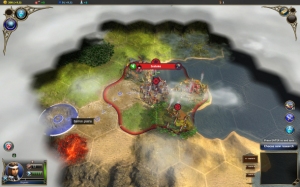 I’d argue that strategy games appeal to a lot of people for one pretty simple reason: they allow their audience to play god in a way that other genres don’t. Ino-Co Plus, developers of the forthcoming (impenetrably named) Warlock: Master of the Arcane get this. They know that the person sitting at their computer, ordering tiny little armies to wage war and tiny little builders to construct settlements is attempting to exert control over some part of their lives, that their careful forethought and desire for virtual conquest stems from the need to own something, no matter how intangible that something may be.
I’d argue that strategy games appeal to a lot of people for one pretty simple reason: they allow their audience to play god in a way that other genres don’t. Ino-Co Plus, developers of the forthcoming (impenetrably named) Warlock: Master of the Arcane get this. They know that the person sitting at their computer, ordering tiny little armies to wage war and tiny little builders to construct settlements is attempting to exert control over some part of their lives, that their careful forethought and desire for virtual conquest stems from the need to own something, no matter how intangible that something may be.
That, or I just have the pessimistic view that everyone in the world is a megalomaniac.
I just finished playing a few hours of a preview build of Warlock: Master of the Arcane that, while missing some of the fine details, is complete enough to give a good sense of what Ino-Co Plus is going for. If I was writing the back-of-box copy it could probably go something like this:
“In Warlock: Master of the Arcane, you experience direct control over a civilization of mystical creatures and exert your influence to take control of a vibrant fantasy world! Use your Great Mage’s magical skills to turn the tides of battle and level up your army’s units to customize them to suit your unique playstyle!”
(Just hire me now, developers and publishers. I could write these all day.)
 As sketched out above, Warlock is essentially a mash-up of strategy staples like the hex-based Civilization franchise and the role-playing influenced King’s Bounty/Heroes of Might and Magic. This amalgamation works like this: each campaign kicks off with players choosing from a number of different Great Mages — ladies and dudes with different attributes favouring, say, farming the landscape or conjuring various monsters and spells. Once the game proper starts it strongly resembles Civilization, featuring hex-based city building and troop movement, research tiers (with Warlock‘s centred on magic skill upgrading) and the establishment of networked cities and, eventually, nation states.
As sketched out above, Warlock is essentially a mash-up of strategy staples like the hex-based Civilization franchise and the role-playing influenced King’s Bounty/Heroes of Might and Magic. This amalgamation works like this: each campaign kicks off with players choosing from a number of different Great Mages — ladies and dudes with different attributes favouring, say, farming the landscape or conjuring various monsters and spells. Once the game proper starts it strongly resembles Civilization, featuring hex-based city building and troop movement, research tiers (with Warlock‘s centred on magic skill upgrading) and the establishment of networked cities and, eventually, nation states.
This changes as your armies move into battle. Each conflict is influenced by the omnipresent Great Mage, represented by a spell menu in the top left corner of the screen (and, presumably, by every single other action taken by the player). Upgrading different spells allows Mages to buff or debuff units, heal friendly soldiers or launch offensive spells against enemies. As a campaign progresses, your research unlocks magic powerful enough that your levelled-up troops are essentially pawns in a game of chess enacted by opposing Mages.
It’s a simple but strangely compelling mechanic, introducing more direct control over events than most turn-based strategy games allow. Warlock‘s basic hook is probably good enough to help it gain a solid base of strategy fans, even despite how strongly it resembles other, well-established games at first blush. The strength of the Great Mage design is furthered by another distinguishing feature too — a unique tone.
Like I said before, the early build I checked out was missing a lot of its flavour text and icons but, the impression of Warlock thus far makes it seem that it will stand apart from other strategy games by taking itself a little less seriously than the norm. A division of skeleton archers launch an attack complete with cartoony “twang” sound effects, character portraits are goofy send-ups of fantasy archetypes (check the three-headed dragon or the faux-Russian leader) and units range from ghost wolves (my new band name) to spear-clutching goblins. That all of this is fleshed out with reams of tongue-in-cheek lore and a rich, colourful map helps to define an aesthetic that is interesting enough to warrant a look.
***
Reid McCarter is a writer, editor and musician living and working in Toronto. He has written for sites and magazines including Kill Screen, The Escapist and C&G Magazine. He maintains literature and music blog, Sasquatch Radio, and, more importantly, founded, writes and is editor-in-extremis for game site Digital Love Child. His Tweet-fu is strong @reidmccarter.